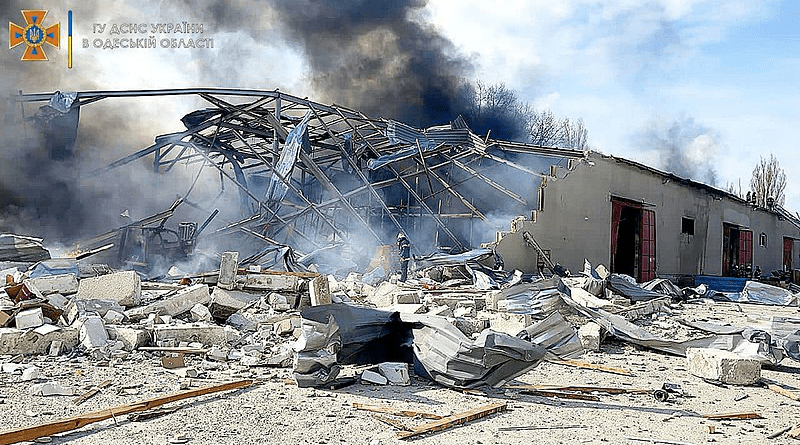Russia Attacks Ukraine’s Black Sea Port Odesa, Attempts To Disrupt Arms Shipments
By VOA
By Jeff Seldin and Ken Bredemeier
Russia launched missile attacks Tuesday on the Black Sea port of Odesa, Ukrainian officials said, as Moscow attempted to disrupt critical weapons shipments and supply lines into Ukraine in the 11th week of the grinding war.
The Ukrainian military said Russia fired seven missiles at Odesa targets, hitting a shopping center and a warehouse, killing at least one person and wounding five more.
Mayor Gennady Trukhanov visited the warehouse at daybreak and said it “had nothing in common with military infrastructure or military objects.”
Ukraine contended that some of the munitions fired at Odesa dated back to the Soviet era, making them unreliable at targeting. But a Ukrainian think tank tracking the war, the Center for Defense Strategies, said Moscow used some precision weapons against Odesa: Kinzhal, or “Dagger,” hypersonic air-to-surface missiles.
However, a senior U.S. Defense Department official told reporters, “No indications that we’ve seen the hypersonics have been used on Odesa, certainly nothing we can confirm.”
Aside from the missile attacks, the Defense Department said it does not believe Russia has the capability to launch a ground or maritime attack on Odesa.
Fighting has been concentrated in eastern and southern Ukraine in recent weeks after Moscow pulled troops from elsewhere in the country, including the area surrounding the capital Kyiv in northern Ukraine.
However, Avril Haines, the U.S. director of national intelligence, told the Senate Armed Services Committee that the intelligence community assesses that Russian President Vladimir Putin will not be content with capturing eastern Ukraine, if even that occurs.
“We assess President Putin is preparing for prolonged conflict in Ukraine during which he still intends to achieve goals beyond the Donbas” region, Haines said.
“We assess that President Putin’s strategic goals have probably not changed, suggesting he regards the decision in late March to refocus Russian forces on the Donbas as only a temporary shift to regain the initiative after the Russian military’s failure to capture Kyiv,” she said.
There appears to be no end near in the fighting, with inconclusive results so far, even with thousands of Russian forces and Ukrainian troops and civilians killed.
Lieutenant General Scott Berrier, the director of the U.S. Defense Intelligence Agency, told the Senate committee that neither side is winning.
“The Russians aren’t winning, and the Ukrainians aren’t winning, and we’re at a bit of a stalemate here,” Berrier said.
Their testimony came as the U.S. House of Representatives prepared to debate a bill authorizing nearly $40 billion in new military and humanitarian aid for Ukraine, $7 billion more than President Joe Biden asked for last week. Biden said his administration has “nearly exhausted” his existing authority to send weapons and other military equipment from Pentagon stockpiles.
Secretary of State Antony Blinken and Defense Secretary Lloyd Austin issued a similar appeal in a letter to lawmakers, urging them to act before May 19 when they expect the existing drawdown will run out.
Senate Minority Leader Mitch McConnell said Monday that while the new measure under consideration “may adjust some in the process,” he is focused on “getting it done quickly.”
Biden signed separate legislation Monday giving him new power to expedite the shipment of military equipment and supplies to Ukraine under a program modeled after a World War II law that originally assisted European countries fighting Nazi Germany.
The new measure gives the U.S. leader the authority to reach quick agreements with Ukraine as well as other Eastern European nations for the shipment of the equipment, bypassing some of Washington’s bureaucratic rules.
In a rarity for politically divided Washington, Congress overwhelmingly passed the legislation last month in a continuing show of support for the Kyiv government as it battles Russian forces.
Ukrainian President Volodymyr Zelenskyy said in a late Monday address that history will hold Russia responsible for its actions in Ukraine, and that Europe has to consider the price Russia should pay “for bringing the evil of total war to Europe again.”
“And we, Ukrainians, will continue to work toward our defense, our victory and on restoring justice. Today, tomorrow and any other day that is necessary to free Ukraine from the occupiers,” Zelenskyy said.
The head of the U.N.’s human rights monitoring mission in Ukraine, Matilda Bogner, told reporters Tuesday that her office had confirmed more than 7,000 civilian casualties, including 3,381 deaths, since Russia launched its attack on Ukraine, and that the real toll is far higher.
German Foreign Minister Annalena Baerbock made an unannounced visit to Ukraine on Tuesday that included a stop in Bucha.
Baerbock is the latest international figure to go to Ukraine to show support and get a first-hand view of the situation in the country. U.S. first lady Jill Biden and Canadian Prime Minister Justin Trudeau made separate visits to Ukraine on Sunday.
Russian President Vladimir Putin on Monday blamed Western nations for his invasion of Ukraine, saying Russia acted in response to “an absolutely unacceptable threat next to our borders.”
But the longtime Russian leader did not announce any change in Moscow’s military campaign or declare victory, suggesting that his offensive would continue with attacks on Ukrainian strongholds in the eastern part of the country after Russia failed to topple Zelenskyy or capture the capital of Kyiv.

